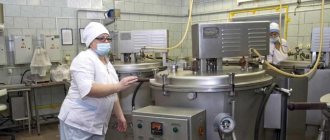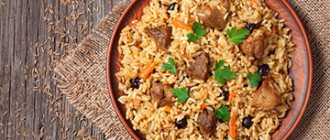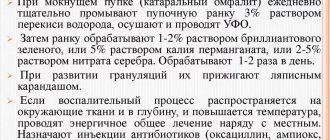How is a liquid mixture different from a dry mixture?
Modern liquid mixtures do not differ in composition from dry ones.
The main advantage of the ready-made mixture is convenience, safety of use and time saving!
- The finished mixture contains the exact proportion of liquid and all components; there is no need to worry about the exact amount of the mixture, water temperature and its quality.
- Ready-made infant formula is produced under special, sterile conditions. Aseptic packaging maintains the sterility and freshness of the product.
Who is eligible to receive free dairy food?
- pregnant women in Moscow and the Moscow region after registering with the antenatal clinic. The pregnancy must be at least 12 weeks;
- nursing mothers, if their child is under 6 months old and is breastfed;
- children under the age of three years (from 0 to 6 months - provided that they are mixed or artificially fed).
If a woman is breastfeeding several children at once, then only one child is given breastfeeding. The rest receive benefits for bottle-fed children.
When is it better to use a liquid ready-made mixture?
The liquid ready-made formula can be used continuously as the main food from the first days of a child’s life to 12 months. After a year, the transition to the “adult” table should be gradual, and the baby’s diet should retain a sufficient amount of easily digestible protein and vitamins. For this purpose, there are liquid milk drinks for children aged 1 to 3 years (they are marked with the number 3 on the packaging). Ready-made formulas for children of the first year of life and milk drinks for children after one year of life are very convenient for feeding the baby while traveling, long walks or at night, going to the doctor and in any other situation.
Today, liquid ready-made formulas are widely used in maternity hospitals and hospitals as safer food from a hygienic point of view.
Liquid adapted milk formula for feeding babies up to one year old.
Popular liquid adapted milk formulas include: acidophilic milk formula “Malyutka”, “Baby Milk”, “Agusha”, “Adalakt”, “Bifilin”, etc. At the plant there are children. dairy products in Moscow, the production of ready-made milk formulas has been mastered; they are adapted and ready for use. These are “Agusha” mixtures, which are suitable for feeding babies under one year old. This series includes 2 variants of sterilized liquid mixtures (Agusha-1 and Agusha-2) + a couple of variants of adapted fermented milk liquids (Agusha-1 and Agusha-2).
- Sterilized adapted mixtures Agusha-1, fresh and fermented milk, are needed when feeding babies from 0 to 5-6 months.
- Sterilized adapt. Agusha-2 mixture, fresh and fermented milk (subsequent mixtures), preferably from six months.
Liquid Agusha-1 is an adapted mixture made from natural cow's milk. The amount of protein is reduced to 1.4 g / 100 g (casein/protein - 40:60), Carbohydrates - lactose with maltodextrin, fat component - vegetable fats. The quantity of minerals, trace elements and vitamins is quite sufficient and corresponds to the physiological needs of a growing child's body in the first months of life. The Agusha-1 series mixture also has the following components: carnitine and taurine.
The liquid milk adapted formula Agusha-2 differs from Agusha-1 by a much higher amount of proteins: up to 1.6 g / per 100 mg with a predominance of the casein component (60/40); iron, vitamins, as well as increased energy value, which is determined by the needs of the child’s body.
All Agusha mixtures (fresh and fermented milk) include vitamins (A, E, D, C, PP, B1, B2, B6, B12, folic and pantothenic acids) and minerals (calcium, phosphorus, potassium, sodium, iron, copper , manganese, zinc, magnesium, iodine) in accordance with age.
Fermented milk mixtures are obtained by fermenting milk with lactic acid bacteria. In fermented milk mixtures of the Agusha series, bifidobacteria and lactobacilli are used for ripening, microorganisms that have a good effect on the baby’s intestinal microflora.
When should you use fermented milk mixtures?
The use of fermented milk mixtures is advisable:
- with mixed and artificial feeding of healthy babies up to one year;
- with long-term use of antibiotics;
- in the presence of intestinal dysbiosis;
- in the presence of allergic diseases.
What is the advantage of liquid adapted milk formulas?
Advantages:
- sterility;
- no need to cook;
- the correct chemical composition (you yourself may not follow the portion).
Adapted milk formulas of the Agusha series are sold in TETRAPAK packaging of 200 ml. It is necessary to carefully study the expiration dates: no more than 5 days from the time of manufacture of the product for fermented milk mixtures and no more than 3 months for fresh mixtures. Look at the storage temperature of the product: no higher than 25°C for fresh mixture and no lower than 6°C for fermented milk.
Addresses and opening hours of the dairy kitchen in Moscow and the Moscow region
Over the past year, the operating hours of dairy kitchens have been transformed based on the interests of mothers and babies, who find it more convenient to receive food early in the morning. Therefore, all kitchens start working from 06-30. As for the end of the shift, this usually happens before lunch (10-00, 11-00, 12-30).
The specific schedule can be clarified in several ways:
- Find it online by typing in a search engine: “Moscow clinic No.__ dairy kitchen.”
- By calling the clinic (each pick-up point is assigned to a specific hospital).
In total, there are more than 190 distribution points in Moscow. On the Internet you can see the location and operating mode of each of them.
Remember
- Receiving food packages from dairy kitchens is not possible in all regions of the country.
- At the local level, they complete the set - whether juices and purees are included with milk and curds. This is decided by the self-government of the city, the subject. Therefore, it is impossible to approve the norm at the state level.
- Products from dairy kitchens can be received by pregnant, lactating women and children from birth to 3, 7 or 15 years of age, depending on the region.
- In some regions, instead of a ready-made set of products, monetary compensation is provided.
Dessert Video: 9 Crazy Wave Pools That Really Exist
Procedure for issuing free meals at the dairy kitchen in 2019
To register the possibility of receiving products from a dairy kitchen, you should collect a complete list of documents, taking into account your specific situation (you may additionally need a certificate from a large family or medical certificates).
Who to contact for a recipe for dairy cuisine in Moscow and the Moscow region
To receive products, you need to write an application and receive a prescription, which is issued by your local pediatrician. He enters into the document a complete list of products that should be given to the mother and/or her child.
Products are usually issued within 10 working days from the day the full list of documents and application was submitted. Often in clinics the prescription itself for the next month can be written out before the 25th of the current month (if it falls on a weekend, even earlier).
How often should a prescription be filled?
The frequency of prescription depends on the age of the child and the position of the mother:
- for pregnant women at all stages - for a calendar month;
- nursing mothers and children aged 12 to 36 months – for 3 months;
- for everyone else – for six months.
Recently, it has become possible to receive food for a month at once. This does not apply to perishable products (kefir, cottage cheese, etc.). A special application is provided, the form of which can be obtained directly at the point of issue.
Important! If the prescription is written out for a child, the mother must be present at the doctor’s appointment with him. Otherwise, the doctor will not be able to do this by law.
On the possibility of receiving products from a dairy kitchen without registration
There are opportunities to obtain dairy products if the location of the clinic and the registered address do not match. Here are some options:
- If a citizen is registered in one district of Moscow, but lives in another, then it is enough, along with the standard set of documents, to attach a statement that at the place of registration he does not receive any products from the dairy kitchen.
- If a citizen is from out of town, but has issued temporary registration in Moscow, he has the same right to receive products as Muscovites with permanent registration.
All other cases – i.e. when visitors do not have temporary or permanent Moscow registration, they exclude the possibility of receiving food.
Dairy kitchen, addresses, Moscow: where the kitchens are located
Each district of Moscow has its own dairy kitchen, which is usually located at a children's clinic. Your local pediatrician can tell you the address of the kitchen; he can also give you more detailed information and advise you on applying to the dairy kitchen.
To find the desired dairy kitchen in the capital, enter in the search the name of the administrative district and the clinic to which you belong. Most milk distribution points are open daily, but there are kitchens that are not open on weekends.
Dairy kitchen sets, Moscow: what they give
The main innovation of 2021 is that now children's dairy. the kitchen provides products in sets, that is, you receive ready-made sets in a corrugated box.
The kits are designed so that the child receives a variety of nutritious nutrition for his age. For example, now vegetable puree has its own requirements, and the content of each vegetable in the food set is regulated. Previously, they could only give you cans of one flavor.
An example of one corrugated set:
- Two types of dry porridge (multi-cereal and rice);
- Fruit juice;
- Vegetable puree;
- Fruit puree;
- Meat-grows. puree;
- Meat puree;
- Cottage cheese;
- Milk;
- Kefirchik.
Answers to readers' questions
The main provisions of the legislation make it possible to obtain product sets without any problems. But there are some peculiarities in the form of assistance. They relate to certain categories of citizens and the nuances of issuing dairy products.
How to get a dairy kitchen through State Services?
Registration of benefits electronically is not possible in all regions of the country. So, this opportunity works in Moscow on the mos.ru portal and in the Moscow region, but on the Moscow Region services portal. The algorithm looks like this:
- go to the portal uslugi.mosreg.ru;
- enter a search query “Assignment of monthly cash payment for food”;
- click on the “online” button;
- the site will redirect to the form filling section;
- log in to the ESIA system;
- fill out an extended application - enter data from the main documents.
Legislatively, the state does not oblige in any way to provide the possibility of issuing assistance in electronic form. Therefore, such a decision depends on the specific subject of the Russian Federation.
Working hours of the dairy kitchen in Moscow?
There are 250 milk distribution points in the capital. They work seven days a week - from Monday to Sunday. Opening hours: from 6.30 to 12.00.
What are Putin’s child benefits, who is entitled to them and how to get them
How to get money for a dairy kitchen?
It is impossible to replace products issued by the state with money. If the regional law stipulates the possibility of obtaining financial assistance, then they receive money. If the delivery of products is prescribed, it will not be possible to receive a cash equivalent.
For example, in St. Petersburg, the dairy kitchen has been replaced with cards used to pay for products. But in Moscow, monetary compensation is not provided.
Where to donate baby food in Moscow?
Since the products are issued the same for everyone, they do not always suit the recipient. For example, an allergy may be to dry mixtures, juices and purees. Then the question arises, where to give the products. There are groups in Moscow where parents can exchange help. The Cuckoo Society is one of these. There you need to place a post marked “I’m giving away” and write to someone who needs the products.
Charitable organizations also accept food packages. But there is a limited list - only those products that can be stored for a long time. Fresh milk will not work, as there may not be anyone who needs it in such a short time.
What mixture is given in the dairy kitchen?
Each medical institution has different brands of formulas and other products. It all depends on which supplier the contract is concluded with. This can be clarified in advance with the doctor who writes the referral. In Moscow, for example, the products most often included in the sets are Fruto-nanny, Similak, and Malyutka.
From when can pregnant women eat milk?
The moment at which a pregnant woman can apply for milk is prescribed in the laws of the subject. Therefore, there are no general rules for the entire Russian Federation.
For example, in Moscow, a pregnant woman can receive milk from the very first day of registration until the birth of the child. The same rules apply to St. Petersburg.
Is the dairy open on Sunday?
The operating hours of the milk distribution point depend on the specific region. So, in Moscow you can get baby food any day of the week. The points are open from 06.30 am until lunch – 12.00.
But in Ufa you can only get milk on weekdays. But reception hours are longer than at Moscow points - from 08.00 to 17.00.
Where can I complain about a dairy kitchen?
Milk dispensing points are an integral part of a medical institution. In this regard, if problems arise with the operation of the dairy kitchen, you should seek clarification from the management of the hospital or clinic.
Responsibility for violations in this area lies with the persons specified in Federal Law No. 323-FZ “On the fundamentals of protecting the health of citizens in the Russian Federation.” Article 98 of the law states that these include:
- Government departments. These are city or regional councils, health departments, Rospotrebnadzor.
- Local government bodies. You can send a complaint to the district government, to the department for work with the population.
- Officials of organizations. These include heads of medical institutions and those who supervise the work of dairy kitchens.
What is a birth certificate and why is it needed?
What is provided in the dairy kitchen for families with many children?
For large families there are no additional or special food packages provided at the dairy kitchen.
The only exception is that in Moscow, children from large families are given products from the dairy kitchen up to 7 years of age, while those without large families are only given up to 3 years of age in general cases and up to 15 years of age if the child has one of the chronic diseases listed in the section above . If the disease is detected in a child from a large family, he will also be given food until he is 15 years old. Read also: What is due to large families in 2021: benefits, payments, allowances and other assistance from the state.
What do they give in the dairy kitchen after a year?
Depending on the program of the subject of the Russian Federation, additional products are added to dry and liquid mixtures. After a year in Moscow, in addition to baby milk, they give out:
- kefir;
- cottage cheese;
- fruit juice;
- fruit puree.
In the Republic of Tatarstan, adapted mixtures are excluded and issued:
- milk;
- kefir and similar fermented milk products;
- cottage cheese.
Is the dairy kitchen open on holidays?
The organization of work of each specific dairy kitchen depends on the region in which it is located. This norm is not regulated by law and each medical institution has the right to set its own schedule. For example, Moscow points work seven days a week and are open on holidays.
Single mother: benefits and allowances, as well as additional social assistance and subsidies in 2021 + analysis of situations
How to find your dairy kitchen?
Distribution points for milk and fermented milk products are directly linked to medical institutions. After issuing a prescription form, the doctor sends the order to the dairy kitchen. They are organized in the same area where the medical institution is located. Therefore, you can find out the address of the food kit distribution point immediately at your doctor’s appointment.
The same information is duplicated on the prescription for issuance - you cannot go to another point for products. They are ordered strictly according to the quantity specified in the documentation. To avoid confusion and delays in delivery, you must arrive on the appointed day and at a specific point.
How much formula is given in the dairy kitchen?
Portion sizes are set individually in each region. You can compare the indicators in Moscow and the Republic of Tatarstan.
In Moscow, 4800 ml of liquid formula is given per child per month, until 6 months. In the Republic of Tatarstan, 6000 ml of the same product is given out per month. Everything depends on funding within the region and on the decision of local authorities in terms of distribution of budget funds.
Standard operating hours for pick-up points
In cities, distribution points set their own opening hours, as well as the days of the week when products are released. This is explained by the days the products are received - all products must be fresh. The standard delivery time for kits is considered to be from 9 a.m. to 9 p.m. In most cities, working days are shortened, sometimes delivery takes only 2-3 hours, which is also explained by the impossibility of storing for a long time. For example, if the dispensing point is located in a clinic, it may simply not have refrigerators to accommodate a large amount of milk.
Dairy cuisine, like many years ago, today has a certain popularity due to the need to support low-income families or young mothers who need good nutrition for pregnancy and lactation. The following interesting facts can be highlighted in this question:
- Dairy kitchens for pregnant women in most cases involve providing women with milk, juices and special vitamins.
- In many regions, monetary compensation is a meager amount. In the Yaroslavl region, compensation is paid in the amount of 200 rubles, and in the Republic of Chuvashia - only 100 rubles.
- Low-income families and large families who apply through Social Security receive the right for a year or until the child reaches 3 years of age.
The opportunity to receive food packages should not be neglected, as this often turns out to be an excellent help for mothers and babies who find themselves in difficult financial situations.
Standards for issuing and list of dairy products in Moscow
Dispensing rates directly depend on the age of the baby, as well as on the position of the mother (pregnant or nursing). Main supplier - . The general list of products is as follows:
- Milk and fermented milk mixtures specially processed for baby food (“Agusha”).
- “Agusha” juices for children of all ages, with and without pulp: apple, pear, peach and mixes.
- Fruit puree “Agusha”: berry (blueberry, currant) or fruit (apple, apricot), as well as berry-fruit mixes.
- Vegetable puree “Bebivita” (from carrots, pumpkin, zucchini, broccoli and cauliflower).
- Poultry , beef, turkey and veal puree, developed specifically for children of all ages with and without the addition of vegetable puree (Agusha and Bebivita brands).
- Juices with vitamins and minerals, designed specifically for pregnant and lactating women at all stages (“Agusha”).
- Milk is specially processed , ultra-pasteurized with a fat content of 2.5% (“Agusha”).
Procedure for receiving free products
The procedure for receiving free products in Moscow in 2021 was approved by the Decree of the Department of Health. Detailed instructions are published on the official website of the Moscow Government.
You can also find there the conditions that a beneficiary must comply with in order to receive free food.
Conditions for receiving free food for pregnant and nursing mothers
To receive free products, a pregnant woman must have a compulsory health insurance policy. It should be noted that without it, even routine medical services are not provided.
The second condition is the presence of permanent registration in Moscow. Also, a pregnant woman is required to register and join a specific antenatal clinic.
Mothers who breastfeed their baby until he is six months old have the right to receive milk and juice. But for this you need to meet the following requirements:
- be registered in Moscow;
- the child has permanent Moscow registration;
- mother and newborn have a compulsory medical insurance policy;
- the baby is assigned to a specific medical institution.
Important! If a mother is breastfeeding two or more children, then free food for the woman is provided as usual. That is, there is no provision for an increase in the norm.
But, in this case, the second and subsequent child has the right to free products.
To receive food, a woman must fill out an application and provide an original passport. The prescription is written by the attending physician after examining the patient.
Conditions for receiving free meals for children
To receive free meals for children under 3 years old, children under 7 years old growing up in a large family, adolescents suffering from chronic diseases and disabled children, it is necessary that the minor has a compulsory medical insurance policy and permanent registration in Moscow. It is also important to be assigned to a medical facility.
A food prescription is issued by a doctor after examining the patient, based on the following documents:
- Statement written by the child's legal representative.
- Birth certificates and compulsory medical insurance policies. You can provide both the original and a copy of the documents.
- Passports of mother , father or other legal representative of the minor.
- A certificate confirming the child’s permanent registration in Moscow. It can be obtained from the territorial division of the Federal Migration Service.
- Papers that confirm the right to receive free food, for example, a doctor’s report on the presence of a chronic disease or an ITU certificate.
Important! If the child is under guardianship, then the package of papers is supplemented with a document that identifies the fact that guardianship has been established over him.
How to get free food: instructions
To receive free food, the beneficiary must first contact their attending physician: pregnant women - a gynecologist, nursing mothers and parents of children - a pediatrician.
The specialist will examine the patient and make a decision on the possibility of providing free food. If the doctor's answer is satisfactory, then the pregnant woman or mother must provide the documents necessary to issue a prescription.
The gynecologist or pediatrician will fill out the paper form and give it to the beneficiary. He is also obliged to tell where the nearest distribution point is located. The recipient of free food only needs to visit the dairy kitchen, provide a recipe and pick up the food.
Dairy standards: Moscow 2021 – table
| Category | What do they give? | Volume norm (month) | Gram per package | How is it issued? | |||
| 0-3 months | Adapted liquid mol. mixture | 4800 | 200 | Once a week | |||
| Adapted dry milk mixture | 700 | 500 | Once a week | ||||
| 4 months Same as + fruit. juice, fruit. puree 1 liter per month | |||||||
| 5 months | Same as line 3-4 months, plus 400 g of dry porridge (once a month), vegetables. puree 1920 g (once a month). | ||||||
| 6 months | Dry mol. mixture – 350 g; Liquid mol. mixture – 2400 g; Vegetable puree – 1920 g; Fruit. puree – 1000g; Fruit. juice – 1200 g; Dry porridge – 400 g. | once a month (all except liquid adaptive mixture) | |||||
| 7-8 months | + to everything previous: children's cottage cheese – 600 g, meat-raised. puree – 300 g, meat puree - 560 g (once a month except for cottage cheese and liquid mixture) | ||||||
| 9-12 months | + baby kefir – 2000 g | Cottage cheese, kefir, liquid mixture - once a week, other - once a month | |||||
| 1-2 years | Det. milk – 2400 (200 g each); Det. kefir – 2400 (200 g each); Det. cottage cheese – 600 g (50 g each); Fruit. puree – 800 g (100 g each); Fruit. juice – 2000 (200 g each). | 1 month 1 Week 1 Week 1 month 1 month | |||||
| 2-3 years | + juice increases by 400 g, but milk decreases by 400 g | ||||||
| Up to 7 years | milk 1800 1000 Once a month | ||||||
| Up to 15 years | |||||||
| Disabled children | |||||||
| Pregnant | Milk | 6000 | 1000 | 1 month | |||
| Juice | 2640 | 330 | 1 month | ||||
| Nursing mothers | Milk | 8000 | 1000 | 1 month | |||
| Juice | 3300 | 330 | 1 month | ||||
How to apply for a benefit?
In all regions, the authority to implement this part of the state program to support motherhood and childhood has been transferred to the head physicians of municipal medical institutions. That is, the application should be written to him. It should be accompanied by documents proving the existence of the right.
The main list of documents is as follows:
- applicant's passport;
- birth certificate of the baby;
- a certificate confirming the fact of registration of the mother and baby in the area of jurisdiction of the medical institution (issued by the Federal Migration Service);
- health insurance policy;
- Pregnant women enclose a certificate of registration;
- instructions from the supervising physician on indications for the provision of additional milk nutrition.
In some situations, the package of documents will have to be expanded. Additional certificates are taken to confirm eligibility in the following cases.
- If the child is recognized as having a disability, then an ITU certificate is required.
- A certificate of a large family provides additional benefits (depending on the region of residence). Therefore, it is necessary to provide copies of birth certificates for all offspring.
- Children suffering from chronic illnesses are also provided with free food. The diagnosis is confirmed by a certificate from a pediatrician (other specialist).
- In some regions, free baby food is limited to low-income people. This means you will have to collect income certificates from all adult family members. In addition, confirmation of the presence/absence of marriage registration may be required.
For information: a low-income family is a rather flexible concept. As a rule, such a unit of society is recognized as one in which the income per person does not exceed the subsistence level. The latter is installed quarterly:
- The Government of the Russian Federation as a whole for the country;
- regional government for the territory under its jurisdiction.
What to write in the application?
The application form for the provision of benefits is developed by the Office exercising regional powers in the field of medicine. The form should be requested at the medical institution. Statement (
) should contain the following data:
- personal information about the applicant: Full name fully;
- recipient's details: full name, date of birth and registration address (the first two points may be the same if the application is submitted by a pregnant woman);
- consent to data processing.
The form contains a request to be included in the Register of Milk Nutrition Recipients. If the medical institution does not issue the form, then the application can be written in free form. The main thing is that it reflects all the above information.











